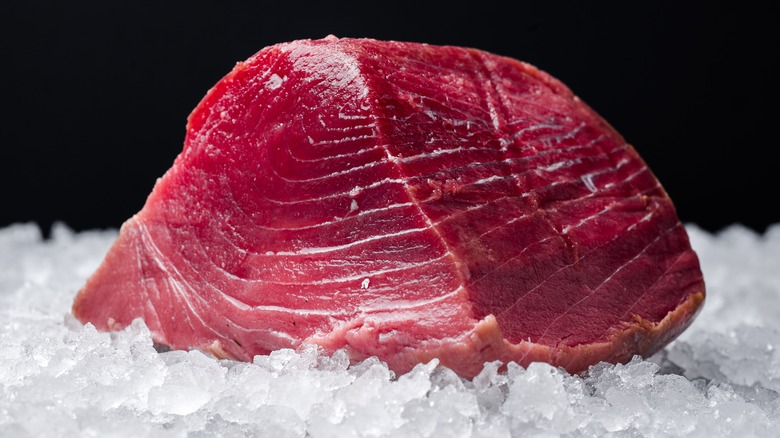Is Tuna A Sustainable Seafood?
World Tuna Day is observed each year on May 2, per National Day Calendar, offering tuna lovers everywhere an opportunity to celebrate this tasty and versatile seafood. Indeed, versatility may be tuna's greatest asset. It's wonderful raw as an ingredient in sushi and sashimi, or paired with avocado in ceviche, but it also is enjoyable when forked out of a can. Tuna makes a great sandwich, is delicious in salads, and when served in steak or sesame-crusted medallion form provides a memorable main course.
The myriad ways that tuna can be prepared and its widespread consumption by people who include it as a regular part of their diets raise questions about its longterm sustainability. According to the World Wildlife Fund (WWF), there are five species of tuna that are commonly fished commercially: skipjack, yellowfin, bigeye, albacore, and bluefin. As WWF observes, several members of the tuna family have experienced overfishing in specific ocean habitats. Currently, for example, there are concerns about the overfishing of yellowfin tuna in the Indian Ocean, bigeye in the Atlantic, and Pacific bluefin.
The current state of tuna stocks
Because of the importance of tuna, both as a food source and as an industry — it accounted for $40.8 billion worldwide in 2018, per the Pew Charitable Trusts – there are national and international organizations involved in the sustainable management of tuna stocks. These include the Marine Stewardship Council (MSC), an international non-profit that helps to monitor and manage sustainable fishing through labeling and certification programs, and the National Oceanic and Atmospheric Administration (NOAA), which is tasked with ensuring productive and sustainable fisheries for the U.S.
According to NOAA, three of the five commonly fished tuna species are being sustainably managed and fished at the recommended level. NOAA has flagged bigeye tuna and Pacific bluefin as being significantly below the population levels they've targeted as sustainable, and notes that it is working with other nations on cooperative rebuilding efforts for these stocks. Overall, however, global tuna numbers are strong, an assessment confirmed by the International Union for Conservation of Nature's Red List, which lists tuna as a species of "least concern." MSC, meanwhile, notes that nearly half of the world's tuna is either from fisheries enrolled in their certification program, or testing to their standards.

